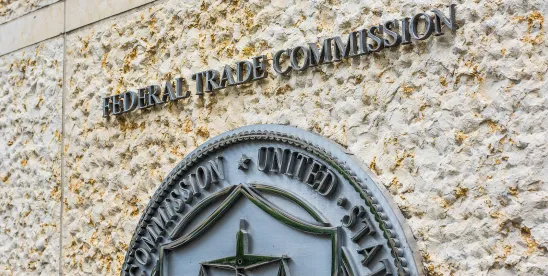It is nearly impossible to think about the Federal Trade Commission (“FTC”) without thinking about the chaos caused by the non-compete ban it approved last year over vociferous dissent only to have the ban vacated and set aside nationwide by the Northern District of Texas. Curiosity remains about what the impact of the change in administration will have on the FTC’s approach to this issue of paramount importance to employers. But with President Trump’s appointment of Andrew Ferguson to lead the FTC, what follows is some insight on the current state of play and the FTC’s probable mindset.
Where We Were Last Year
As a recap, the FTC’s “Final Rule” announced on April 23, 2024, would have banned nearly all non-compete provisions and provisions functioning as non-competes (in the FTC’s view). That Final Rule, which was set to go into effect on September 4, 2024 (the “Effective Date”), would have impacted not only traditional restrictive covenant agreements with employees and contractors but likely also agreements with employee equity holders as well as claw-back and repayment agreements with employees presented with signing bonuses or training and education opportunities.
As expected, businesses and trade organizations swiftly challenged the Final Rule, with lawsuits filed against the FTC in Pennsylvania, Florida, and Texas seeking to set aside the Final Rule: a lawsuit brought by a tree-service company, ATS Tree Services, LLC in the Eastern District of Pennsylvania; a lawsuit brought by the Properties of Villages Inc.in the Middle District of Florida, and lawsuits brought by tax-advisory firm Ryan, LLC and the U.S. Chamber of Commerce in the Northern and Eastern Districts of Texas, respectively. The lawsuits yielded distinct outcomes. The Texas court preliminarily enjoined enforcement of the Final Rule as to the plaintiff only, pending a final ruling on the merits. The Pennsylvania court upheld the Final Rule. The Florida court preliminarily enjoined the Final Rule as to the plaintiff only, on similar but not identical grounds to the Texas court, even while accepting some of the Pennsylvania court’s analysis.
The limited holdings and contradictory outcomes made the chaos sewn by the FTC even worse in the weeks leading up to the Effective Date. Ultimately, the Texas court provided clarity, issuing its final ruling on the merits and vacating and setting aside the Final Rule nationwide holding that its issuance was outside FTC’s authority granted by Congress and that the Final Rule was otherwise arbitrary and capricious under the Administrative Procedure Act. The FTC has appealed both the Florida and Texas rulings, and the plaintiff in the Pennsylvania ruling voluntarily dismissed its lawsuit after the Texas court ruling.
Where We Are Now
Although the FTC appealed the Properties of Villages Inc. (Florida) and Ryan, LLC (Texas) decisions, with the change of administration this week and the appointment of Ferguson to lead the FTC, many have questioned whether the FTC will proceed with those appeals. Since Ferguson has in the past voiced opposition to the Final Rule and expressed an opinion that the FTC lacks the authority to promulgate such a ban, asserting in his Dissent a view which was nearly identical to the Texas court’s conclusion that “Congress has not authorized [the FTC] to issue it. The Constitution forbids it. And it violates the basic requirements of the Administrative Procedure Act,” it is likely the FTC folds.
Unlike outgoing FTC Chair Lina Kahn, Ferguson has indicated that the FTC will, under his leadership, focus on traditional antitrust issues, as reflected in a post made on social media platform X announcing that the FTC “will end Big Tech’s vendetta against competition and free speech” and will “make sure that America is the world’s technological leader and the best place for innovators to bring new ideas to life.”
With the shift away from Khan and the change in administration, it is likely that the FTC’s pending appeals and its previous focus on a widespread ban of non-competes will fall to the wayside. However, this change in focus does not give employers free reign to craft and enforce non-competition and non-solicitation restrictions without any limitations whatsoever. Instead, the individual states hold the power to restrict the use of restrictive covenant agreements unless and until the U.S. Congress passes a law signed by President Trump or his successor restricting the use and enforcement of non-competes (notably, such legislative proposals and a bi-partisan willingness to address the issue do exist, albeit on a much lesser scale than the FTC’s now vacated Final Rule). As Ferguson noted in his Dissent to the Final Rule, the “established system of sensible state regulations” controls the validity of non-compete agreements. Given the patchwork of state laws addressing the use and enforcement of non-compete and non-solicit agreements—including some states that have significant civil and administrative penalties and fee-shifting remedies for non-compliant agreements and growing efforts at the state level to restrict their use—compliance with that patchwork is a complex undertaking for companies with multistate operations and dispersed workforces.
What Steps Should Employers Take Now?
This change in administration and FTC focus provide an ideal opportunity for companies to re-evaluate existing restrictive covenant agreements and to make necessary changes. We recommend companies consult with counsel to ensure all restrictive covenants with employees (including with employee equity holders) are in compliance with applicable state laws and regulations, especially companies who have or will have employees residing and working in multiple states. It is also notable that the reliance many companies have historically placed upon courts to modify (or “blue pencil”) agreements that are overbroad and unenforceable as written has also been called into doubt lately in courts across the country, affirming the sensibility of such a re-evaluation.
Generally speaking, companies should avoid overbroad and unreasonable restrictions that could be construed as unacceptable restraints of free trade and should limit the use of restrictions to those employees whose roles and responsibilities or access to sensitive, confidential, or trade secret information or customer relationships support them. Companies should take this time to replace potentially unenforceable provisions with narrowly tailored restrictions, with a focus on, among other areas, an appropriate, justifiable duration and geographic and subject matter scope for the restrictions. Companies should also ensure that their implementation procedures comply with relevant states’ requirements on advanced notice, consideration, and compensation thresholds.
Taking the time now to thoughtfully review your restrictive covenant agreements, under appropriate state laws and regulations, will set your company up for success in 2025 and as the new administration gets underway.




 />i
/>i

